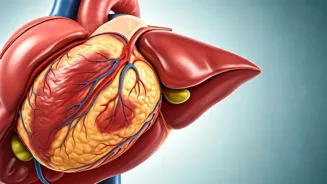The Silent Threat
Fatty liver disease, a condition characterized by excess fat accumulation in the liver, is becoming increasingly prevalent. Often, it goes unnoticed because
symptoms are subtle or absent, but the consequences can be severe. The liver's role is vital in filtering toxins, processing nutrients, and producing bile, among other functions. When it becomes overwhelmed by fat, its performance degrades. This metabolic dysfunction can initiate a cascade of health problems, most notably impacting heart health. Essentially, a struggling liver can trigger inflammation and oxidative stress, disrupting the body’s delicate balance. These changes set the stage for cardiovascular diseases, increasing the risk of serious conditions like heart failure and stroke. The initial silence of fatty liver makes understanding its dangers and preventative measures all the more critical for maintaining overall well-being.
Metabolic Disruption Unveiled
The connection between fatty liver and heart disease lies in their shared roots within metabolic dysfunction. Fatty liver often accompanies insulin resistance, a condition where the body's cells fail to respond effectively to insulin, the hormone that regulates blood sugar levels. This resistance leads to elevated blood sugar and promotes the accumulation of fat in the liver. As fatty liver progresses, it can disrupt lipid metabolism, causing elevated levels of harmful cholesterol and triglycerides, both of which are known contributors to heart disease. Furthermore, the inflammation triggered by a fatty liver can spread throughout the body, damaging blood vessels and accelerating the formation of plaque, a key process in atherosclerosis (hardening of the arteries). This complex interplay reveals why the health of the liver is so intrinsically linked to the health of the heart. It underscores the importance of proactive health management to address the risks before they escalate.
Heart Disease Consequences
The consequences of fatty liver on heart health are multifaceted. It can directly contribute to the development of cardiovascular diseases, including high blood pressure, coronary artery disease, and heart failure. The inflammation and oxidative stress, resulting from an unhealthy liver, damage the lining of blood vessels, making it easier for cholesterol and other substances to build up and form plaques. These plaques narrow the arteries, restricting blood flow and putting a strain on the heart. The damaged blood vessels are also more likely to form blood clots, which can lead to heart attacks or strokes. Moreover, fatty liver disease is associated with an increased risk of developing an irregular heartbeat, or arrhythmia, which further compromises heart function. The heart may struggle to pump enough blood, leading to symptoms such as shortness of breath, fatigue, and swelling in the legs and ankles. Recognizing these potential outcomes reinforces the need for early detection and intervention to prevent serious, life-threatening health complications.
Early Detection Matters
Identifying fatty liver and its potential impact on heart health requires a proactive approach, starting with regular health check-ups. Simple blood tests can assess liver function and identify elevated liver enzymes, which may indicate a problem. Imaging tests, such as ultrasound, CT scans, or MRI, can provide detailed images of the liver to determine the degree of fat accumulation. Addressing the underlying causes, such as poor dietary choices and lack of physical activity, is paramount. This often involves lifestyle adjustments, including a balanced diet, regular exercise, and weight management, as these directly impact liver health and overall metabolic function. Early detection facilitates timely interventions that can minimize the risk of heart disease, highlighting the importance of understanding your body and seeking medical attention as soon as any health concerns arise. Being informed and proactive is key to safeguarding both your liver and your heart.
Preventive Strategies
Taking steps to protect your liver is a smart investment in your cardiovascular well-being. Lifestyle modifications form the cornerstone of prevention and include dietary changes. Following a diet rich in fruits, vegetables, whole grains, and lean proteins can significantly reduce liver fat accumulation. Limiting processed foods, sugary drinks, and excessive alcohol intake is essential as these can exacerbate liver damage. Regular exercise helps improve insulin sensitivity, manage weight, and reduce inflammation, all of which benefit liver and heart health. Aim for at least 150 minutes of moderate-intensity or 75 minutes of vigorous-intensity exercise per week. Maintaining a healthy weight is also crucial, as obesity significantly increases the risk of fatty liver. It's equally important to manage any underlying health conditions, such as diabetes and high cholesterol. Following these strategies, along with regular medical checkups, enhances your chances of preserving liver health and, as a result, your heart health.













